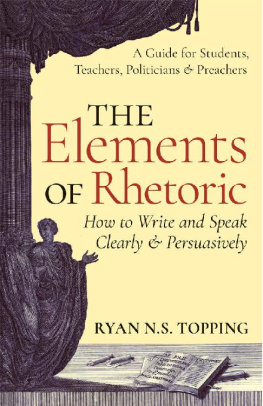WORDS LIKE
LOADED PISTOLS

WORDS LIKE
LOA DED PIST OLS
RHETORIC FROM
ARISTOTLE TO
OBAMA
SAM LEITH

A Member of the Perseus Books Group
New York
Copyright 2012 by Sam Leith
Published by Basic Books,
A Member of the Perseus Books Group
All rights reserved. No part of this book may be reproduced in any manner whatsoever without written permission except in the case of brief quotations embodied in critical articles and reviews. For information, address Basic Books, 387 Park Avenue South, New York, NY 10016-8810.
Books published by Basic Books are available at special discounts for bulk purchases in the United States by corporations, institutions, and other organizations. For more information, please contact the Special Markets Department at the Perseus Books Group, 2300 Chestnut Street, Suite 200, Philadelphia, PA 19103, or call (800) 810-4145, ext. 5000, or e-mail .
Designed by Trish Wilkinson
Set in 11 point Minion Pro
Library of Congress Cataloging-in-Publication Data
Leith, Sam.
[You talkin to me.]
Words like loaded pistols : rhetoric from Aristotle to Obama / Sam Leith.
p. cm .
Previously published as: You talkin to me.
Includes bibliographical references and index.
ISBN 978-0-465-03107-8 (e-book)
1. Persuasion (Rhetoric) 2. English languageRhetoric. 3. RhetoricHistory. 4. Rhetoric. I. Title.
P301.5.P47L45 2012
10987654321
For my mum
Also by Sam Leith
FICTION
The Coincidence Engine
______________
NONFICTION
Dead Pets
Sods Law
Contents
CHAMPIONS OF RHETORIC I:Satan
The Original Silver-Tongued Devil
CHAMPIONS OF RHETORIC II:Marcus Tullius Cicero
The Attack Dog of the Roman Forum
CHAMPIONS OF RHETORIC III:Abraham Lincoln
A Few Appropriate Remarks
CHAMPIONS OF RHETORIC V:Martin Luther King
Daydream Believer
CHAMPIONS OF RHETORIC VI:Barack Obama
The Audacity of Trope
CHAMPIONS OF RHETORIC VII:
The Unknown Speechwriter
LET ME START BY introducing you to a scene from The Simpsons.
MARGE [sings]: How many roads must a man walk down before you can call him a man?
HOMER: Seven.
LISA: No, dad, its a rhetorical question.
HOMER: Okay, eight.
LISA: Dad, do you even know what rhetorical means?
HOMER: Do I know what rhetorical means?
On this little scene, the whole premise of the book you hold in your hand hinges. Do you know what rhetorical means? Because you should. And if Homer Simpson, one of the greatest everyman figures of our time, can make a joke about rhetoric, you can be assured it is not a subject that needs to be intimidating.
So what is rhetoric? Rhetoric is, as simply defined as possible, the art of persuasion: the attempt by one human being to influence another in words. It is no more complicated than that. You are probably accustomed to thinking of rhetoric in terms of formal oratory: the sort of public speeches you see politicians make on television, CEOs make at annual meetings, and priests make on Sunday mornings in church. True, that is, when rhetoric is at its most visiblethats when rhetoric puts on a dinner jacket and polishes its dancing shoes. But that is only one part of a huge area that the term covers.
Rhetoric is a field of knowledge: that is, something susceptible to analysis and understanding in the same way poetry is. Just as people studying poetry talk about anapests and caesuras and catalectic feet, people studying rhetoric have learned to recognize and name some of the ways in which rhetorical language behaves.
But rhetoric is also, and primarily, a practical skillwhat one of its earliest and most important theorists, Aristotle, described as a techn, which is the root of the words technical and technique. Rhetoric is directed at a practical goal; its a means to an end.
Rhetoric is hustling, and our forefathers knew it. For fifteen centuries or so, the study of rhetoric was at the center of Western education. To be able to recognize rhetorical techniques, and to have them at your command, was a central accomplishment of any educated man (they were men, then, mostlysorry).
It was right that it should be so. The business of state had at its heart, as it still has, two institutions: the courts and the machinery of governmentand the practice of rhetoric was central to both. Yet it was and is present wherever there is language.
Inasmuch as the twentieth centuryaka the Century That Rhetoric Forgotpaid much attention to rhetoric, the subject having been colonized largely by speech theorists, structural linguists, and literary critics, it was to point out just that: to note the intrinsic rhetoricality of all language.
Literary theorists and philosophers, you see, were initially intoxicated by the idea that language was ambiguous. Then they grew suspicious that it might be ambiguous for a reason: that metaphorical and figurative language could be serving the interests of Power. Then they wondered if, perhaps, the very nature of language itself was to be metaphorical and figurative andimportant word hereunstable.
Finally they concludedto quote John Bender and David E. Wellbery, who offer a good example of the sort of high-sounding nonsense they talkthat
rhetoricality... manifests the groundless, infinitely ramifying character of discourse in the modern world. For this reason, it allows for no explanatory metadiscourse that is not already itself rhetorical. Rhetoric is no longer the title of a doctrine and a practice, nor a form of cultural memory; it becomes instead something like the condition of our existence.
In other words, language was Not To Be Trusted. But then, Aristotle could have told them that.
What I hope to do in this book is to give you the basics of rhetoric: to trace how people have taught, practiced, and thought about it from its ancient origins to its twenty-first-century apotheosis. I shall tell the stories of some of the great figures in its historythe heroes and villains of the persuasive arts. Men like Cicero, Erasmus, Adolf Hitler, and John F. Ken nedy. Ill explain why George W. Bush wasnt so much of a doofus as all that, and why Winston Churchill wasnt always the great orator that posterity remembers.
I shall equip you with a working knowledge of the technical vocabulary. An alphabetical glossary at the back of the book will give definitions and examples of the various terms, though Ill try to make clear, too, what each one means as it comes up in the text. More important, I hope to give some understanding of the principles that underlie those terms. Ill attempt to give a sense of how arguments prosper and founder: for the technical study of rhetoric is, at root, no more than a systematic way of doing that. Along the way Ill look at some of the great and not so great speeches of this and other ages, and take you through some of the more interesting byways of the Western mind.













